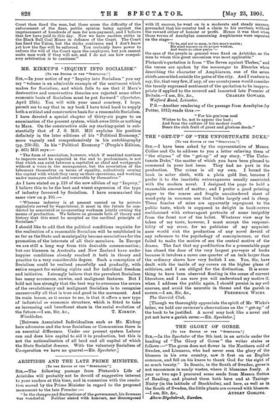ARISTIDES AND THE LATE PRIME MINISTER.
LT0 THE EDITOR OP THE " SPECTATOR.".1 SIE,—The following passage from Plutarch's Life of Aristides will probably not be devoid of suggestive interest
to your readers at this time, and in connexion with the resolu- tion moved by the Prime Minister in regard to the proposed monument to the late Premier :- " In the changes and fluctuations of the government, his firmness was wonderful. Neither elated with honours, nor discomposed with ill success, he went on in a moderate and steady manner, persuaded that his country had a claim to his services, without the reward either of honour or profit. Hence it was that when those verses of Aeschylus concerning Amphiarans were repeated on the stage-
. To be, and not to seem, is this man's maxim; His mind reposes on its roper wisdom, And wants no other praise — the eyes of the people in general were fixed on Aristides, as the man to whom this great encomium was most applicable."
Plutarch's quotation is from " The Seven against Thebes," and the verses are spoken by the messenger to Eteocles when describing the character of Amphiaraus, one of the seven chiefs assembled outside the gates of the city. And I venture to say, Sir, that very few, if any, of our countrymen would consider the tersely expressed sentiment of the quotation to be inappro- priate if applied to the revered and lamented late Premier of Welford Road, Leicester.
P.S.—Another rendering of the passage from Aeschylus (by Potter, 1812) reads thus -- " For his gen'rons soul Wishes to be, not to appear the best; And from the culture of his modest worth Bears the rich fruit of great and glorious deeds."






































 Previous page
Previous page